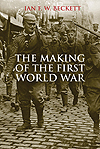 The Making of the First World War, by Ian F.W. Beckett, Yale University Press, New Haven, Conn., 2012, $28.50
The Making of the First World War, by Ian F.W. Beckett, Yale University Press, New Haven, Conn., 2012, $28.50
The generic title of this new book by British military historian Ian F.W. Beckett belies the originality of its approach. Instead of writing just another history of the origins and course of the war, Beckett presents a series of essays focusing on prominent and lesser-known episodes that had significant long-term repercussions. These include the Belgians’ opening of the Flanders dikes in October 1914; the appointment of David Lloyd George as British minister of munitions in May 1915; the first public screening of the film The Battle of the Somme in August 1916; and the first air raid on London by German Gotha bombers in June 1917. Beckett also muses on such well-known events as the 1915 Gallipoli campaign and the 1917 abdication of Russia’s Tsar Nicholas II.
War, as Beckett demonstrates, is about more than just great leaders and decisive battles. Most accounts of World War I’s opening moves devote scant attention to the Belgian army, and yet the flooding of the Yser River by a few Belgian officers and engineers may have played a decisive role in preventing the Germans from capturing the English Channel ports and possibly forcing a British evacuation. Likewise, the Zeppelin and Gotha air raids on London set a dangerous new precedent for warfare against civilians.
Unfortunately, the originality of Beckett’s concept is undermined by poor execution. For the most part the essays are blandly descriptive, based on secondary literature and lacking in focus. Beckett’s commentary on the abdication of Nicholas, for example, amounts to little more than a potted history of the events leading up to the Russian Revolution; and his final essay on the April 9, 1918, German offensive merely summarizes the war’s final months with only passing reference to the supposed primary subject. Nor does Beckett make any attempt to prove his more interesting assertions, such as that the flooding of the Yser changed the course of the war.
Scholars will likely find this book a mixture of the unproven and the pedestrian, while general readers may be deterred by Beckett’s dry prose and tendency to clutter his brief essays with extraneous information. In writing on the Ottoman empire’s entry into the war, for example, Beckett regales readers with a history of the obscure religious sect to which the Turkish finance minister belonged. This and other digressions further muddle essays that, had they been concisely written and persuasively argued, might have contributed compelling new insights on World War I.
—Edward G. Lengel




